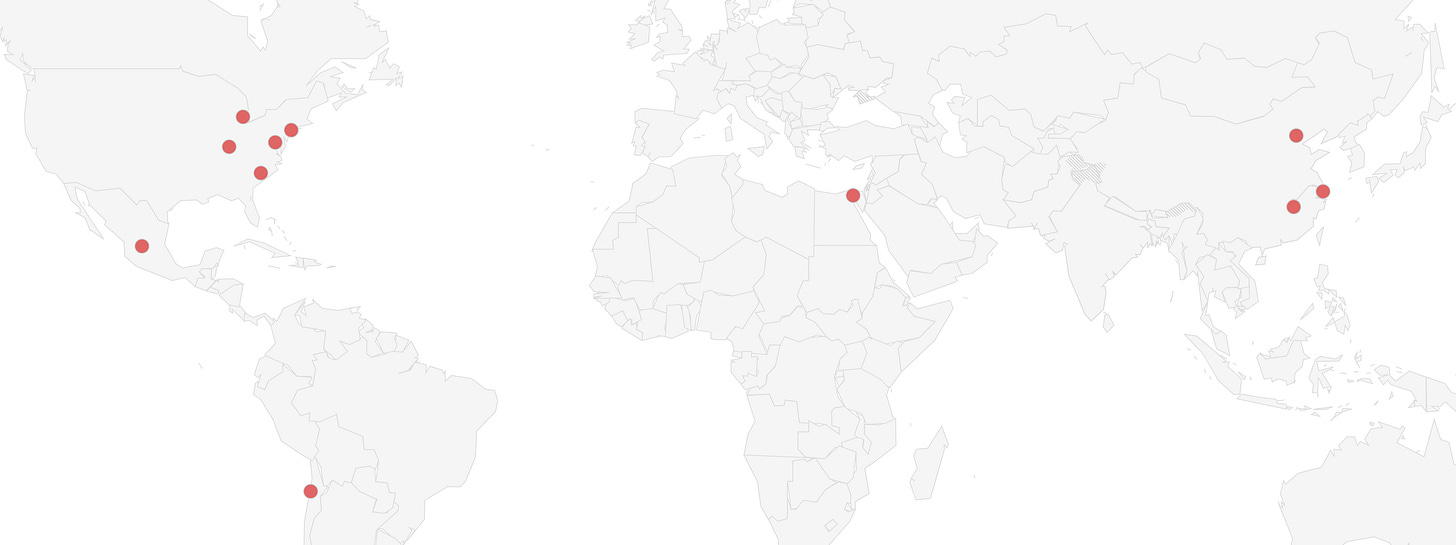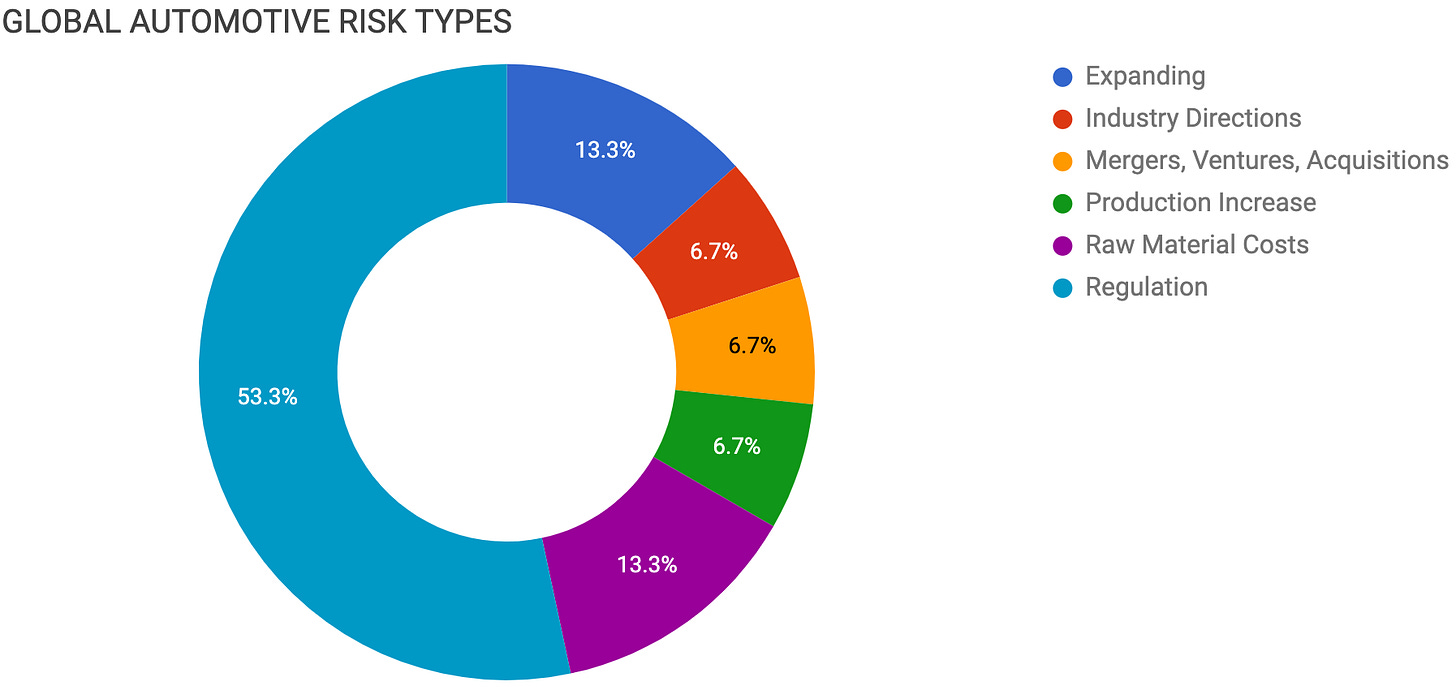Automotive Supply Chain Risk Digest #443
August 8 - 14, 2025, by Elm Analytics
Contents
EXPANDING
Ford revamps plant with EV focus
Tenneco expands Mexico valve output
INDUSTRY DIRECTIONS
Suppliers pass tariffs to automakers
MERGERS, VENTURES, ACQUISITIONS
BMW mulls Chinese battery sourcing
PRODUCTION INCREASE
China sees 13% vehicle sales jump
RAW MATERIALS
CATL shutdown sends lithium prices up
Chile lithium site stable post-incident
REGULATION
Producer inflation pressures auto costs
US-China tariff truce extended
Chinese automakers sail risky Red Sea route
Luxury tax impact in China
Resources for:
Reshoring & navigating tariff risks
Contract pricing & tax terms
Delivery terms & tariffs
Five customs compliance best practices
Expanding
Ford will invest $2B to retool its Louisville Assembly Plant for its new Universal EV Production System, a radical "assembly tree" approach also used in Tesla's unboxed manufacturing process.
The project includes a 52k ft² expansion, integration of large aluminum unicastings and structural batteries into three subassemblies, and digital upgrades to enable faster quality scans.
Ford expects to reduce part counts by 20%, cut workstations by 40%, and shorten assembly time by 15%, while improving worker ergonomics.
CEO Jim Farley called it a high-risk bet to cut costs and sharpen EV competitiveness. If executed successfully, the shift could reset Ford's cost structure and drive deeper supply chain integration.
Tenneco invested $22.6M to expand valve production at its plant in Aguascalientes, Mexico. The new line is expected to increase output by 70%.
Industry Directions
Major auto suppliers are offsetting tariff impacts by passing costs to automakers and gaining new US business from onshoring.
Companies like Aptiv, Adient, and American Axle posted Q2 gains as automakers advanced production and sought cost-effective sourcing.
But long-term risks remain: tariffs on imported equipment raise domestic investment costs, and potential vehicle price hikes could weaken demand.
Mergers, Ventures, Acquisitions
BMW is weighing Chinese battery imports after partner AESC halted its US plant plans, a move that could delay production and face steep US tariffs in 2026. The disruption exposes the fragility of domestic EV battery supply chain investments.
Production Increase
China's July vehicle production and sales rose over 13% YoY, led by a 26% EV sales surge and a 22.6% rise in exports.
Raw Materials
Lithium prices are climbing after CATL halted operations at its Jianxiawo mine in Jiangxi, China, which supplies about 6% of global output.
The three-month shutdown, triggered by an expired mining license, has fueled speculation about broader government-led production limits under China's "anti-involution" policy to curb overcapacity.
CATL says battery production will not be disrupted, but analysts warn that reduced supply could sharply raise lithium costs and push up prices for EV batteries globally.
Additional Yichun mines, which account for another 5% of global supply, may also face restrictions after compliance audits.
A prolonged or expanded halt in China's lithium hub could squeeze raw material supplies and intensify cost pressures across the automotive supply chain.
Albemarle says its La Negra lithium plant in Chile remains fully operational after an incident under investigation, with no impact on sales. The site's stability averts further supply strain in the EV battery materials market.
Regulation
US President Trump has extended the US-China tariff truce to November 10, keeping reduced duties on Chinese auto parts and rare earth magnets critical to EV production.
The move provides short-term supply chain relief for automakers but leaves long-term trade policy uncertainty unresolved.
Chinese carmakers are gaining ground in Europe by doing what rivals won't: shipping through the war-torn Red Sea.
While most global brands reroute around Africa to avoid Houthi attacks, BYD and SAIC continue through the Suez Canal. Analysts believe that quiet deals have been made with Iran or the Houthis.
The shortcut saves weeks and hundreds per vehicle, helping offset EU tariffs.
China has lowered its luxury vehicle tax threshold from $181k to $125k, hitting dozens of high-end models with a new 10% tax.
The sudden move, announced with just 48h notice, pressures already-declining premium sales as economic slowdown and local competitive price wars weigh on demand.
Automakers like Mercedes-Benz, JLR, and Porsche now face steeper pricing and margin strain in their largest foreign market.
The new tax also applies to large SUVs and premium EVs that were previously exempt.
The always insightful Foley has published a swath of new articles over the past week:
What Every Multinational Should Know About the Use of Reshoring to Navigate Tariff Uncertainty
Tariffs and Your Contracts:
Five Compliance Best Practices for Customs Intellectual Property Rights
In July, the US Producer Price Index rose an unexpected 0.9%, indicating higher costs for metals, freight, and tariff-sensitive goods in the automotive supply chain.
Economists are worried about increasing inflation, which could impact US Federal Reserve policies, interest rates, and the profit margins of automotive manufacturers.











